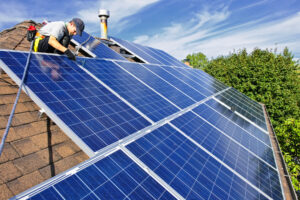Earlier in the year it had been announced that there was a plan in place for a government grant to be issued to homeowners in England in order to improve energy-efficiency in homes across the country, recently more information had been given on how to qualify, what the voucher amounts were, and what upgrades were covered by the grant – so what do you need to know about the Green Homes Grant?
Am I eligible? – To be eligible for the grant, you only need to meet one of two criteria – you must either own your own home (including park homes, long-leaseholders, and shared ownership) or be a private or social landlord. The grant does only apply to home owners in England, however, and as such doesn’t extend to Northern Ireland, Scotland, or Wales. New-build homes also aren’t eligible to receive the grant.
What is the value of the grant? – Homeowners will be able to claim up to a maximum of £5,000 to cover two thirds of an energy saving renovation with the final third being covered by the homeowner. Those who receive certain benefits may be able to claim up to £10,000 and will not be required to cover any cost of these changes.
What is covered by the Green Homes Grant? – The renovations fall into two categories – the primary measures cover either insulation or low-carbon heating solutions, and the secondary measures cover a number of other options. You must install a primary measure to qualify for the grant, and to qualify for the installation of a secondary measure.
Primary measures – These options include;
- Insulation: solid wall insulation, cavity wall insulation, under-floor insulation, loft insulation, flat roof insulation, room-in-roof insulation, and park home insulation
- Air-source heat pumps
- Ground-source heat pumps
- Solar thermal water heating
Biomass boilers have also been announced as part of the primary measures list, however the Department for Business, Energy, and Industrial Strategy have yet to give any further information on the conditions that apply to them.
Secondary measures – These options include;
- Double glazing, triple glazing, or secondary glazing (when replacing single glazing windows)
- Energy efficient doors (for doors installed before 2002)
- Hot water tank thermostat or appliance thermostats
- Hot water. Tank insulation
- Smart heating controls
- Draught proofing
When can I apply? – Applications for the scheme will start at the end of September 2020 and will close at the end of March 2021, so to qualify for the grant you’ll need to act quickly.
Can I choose the trader to perform the work? – Traders must fall into a certain criteria in order to be able to do the work – they must be registered with either TrustMark or MCS.
TrustMark is a government endorsed scheme that vets technical competence, trading practice, and customer service – you can find a list of TrustMark traders near you on their website here.
Microgeneration Certification Scheme (MCS) certifies that low-carbon technologies, and the installers of them, meet the quality standards set out – you can find MCS traders such as Utility Trade Group on their website here.
